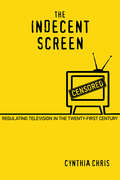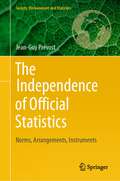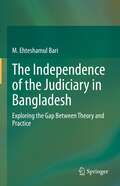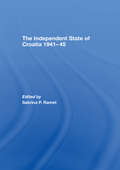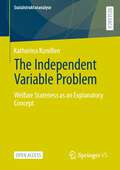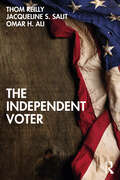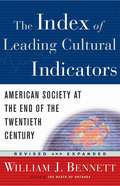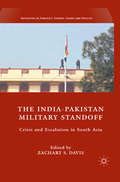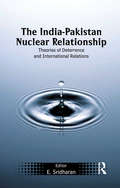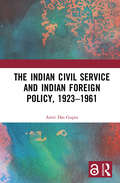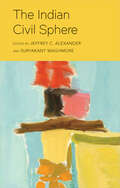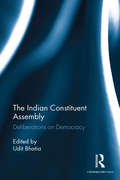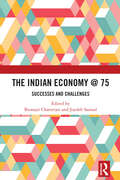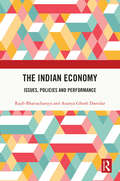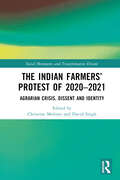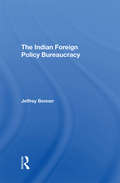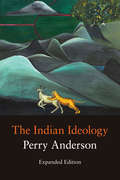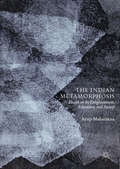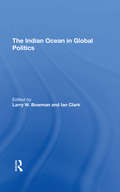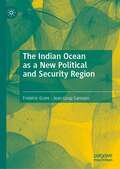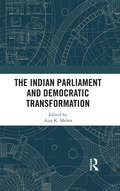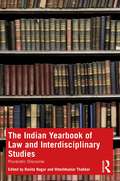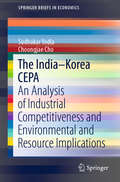- Table View
- List View
The Indecent Screen: Regulating Television in the Twenty-First Century
by Cynthia ChrisThe Indecent Screen explores clashes over indecency in broadcast television among U.S.-based media advocates, television professionals, the Federal Communications Commission, and TV audiences. Cynthia Chris focuses on the decency debates during an approximately twenty-year period since the Telecommunications Act of 1996, which in many ways restructured the media environment. Simultaneously, ever increasing channel capacity, new forms of distribution, and time-shifting (in the form of streaming and on-demand viewing options) radically changed how, when, and what we watch. But instead of these innovations quelling concerns that TV networks were too often transmitting indecent material that was accessible to children, complaints about indecency skyrocketed soon after the turn of the century. Chris demonstrates that these clashes are significant battles over the role of family, the role of government, and the value of free speech in our lives, arguing that an uncensored media is so imperative to the public good that we can, and must, endure the occasional indecent screen.
The Independence of Official Statistics: Norms, Arrangements, Instruments (Society, Environment and Statistics)
by Jean-Guy PrévostThis book explores the independence of official statistics and describes the various legal and professional norms, institutional arrangements, instruments and practices that statisticians have developed over recent decades to protect their work from political interference. It argues that this ‘drive for independence’, which saw the replication of these norms, arrangements, and instruments across countries, was largely led by the international epistemic community of statisticians, and it identifies some of the paths and processes that enabled this drive.The study conducts an overall, multi-dimensional, and detailed comparative examination of the thirty-eight OECD countries’ norms, arrangements, and practices regarding the institutional and professional independence of official statistics. For that purpose, several dimensions have been surveyed and an index has been built that allows patterns and clusters to be uncovered among the OECD countries, shedding light on the variations that can be observed from one subgroup of countries to another.The issue of the independence of official statistics has been at the heart of several recent statistical controversies, including that of Greece’s debt, censuses in Canada and the United States, the Argentinian cost of living index, and some recent cases of resignation or dismissal of senior statisticians in various countries. Such independence has been a major topic of discussion in the epistemic community since the turn of the century, and concerns have also been addressed more widely, in the media. The subject of the book is particularly relevant as official statistics also play a significant role in monitoring the progress of the United Nations’ Sustainable Development Goals. This book will appeal to anyone interested in the topic of official statistics and to students of government in general.
The Independence of the Judiciary in Bangladesh: Exploring the Gap Between Theory and Practice
by M. Ehteshamul BariThis book highlights that an independent judiciary is indispensable for the very existence of any society based on democratic values, such as the observance of the rule of law and respect for the human rights of individuals. In order to ensure that the judiciary’s interpretation of the law is not bound by the will of the executive and that it is able to call the executive to account by protecting the life as well as liberty of the governed, it is imperative to guarantee, among other things, a transparent method of appointment and the security of tenure of the judges. Taking into account the importance of an independent judiciary in a democratic society, the framers of the Constitution of Bangladesh, 1972, following in the footsteps of the framers of the Constitutions of India and Pakistan, incorporated in the Constitution the ideal of safeguarding the independence of the judiciary as one of its basic features. This book, however, makes it manifestly evident that the key elements for realising such an ideal have not adequately been guaranteed by the Constitution. Consequently, this book sheds light on how succeeding generations of executives have sought to undermine the independence of the judiciary. Accordingly, this book puts forward recommendations for the insertion of detailed norms in the Constitution of Bangladesh for establishing the best means for excluding patronage appointments to the bench and for guaranteeing the security of tenure of the judges. This book asserts that the incorporation of such norms, safeguards the independence of the superior judiciary to decide cases without fear or favour. This book, therefore, seeks to address the gap that exists between the theory and practice concerning the independence of the judiciary in Bangladesh. Since no book is currently available in the market that critically examines these issues in a systematic and structured manner, this research enhances knowledge by not only identifying the flaws, deficiencies and lacunae of the constitutional provisions concerning the method of appointment of the judges of the Supreme Court of Bangladesh but also the measures undertaken by the current Bangladeshi regime to dispense with the transparent method of removal of the judges involving a body of judicial character.
The Independent State of Croatia 1941-45 (Totalitarianism Movements And Political Religions Ser.)
by Sabrina P. RametThis special issue provides important new scholarship from a variety of perspectives on the structure, ideology and political history of the central fascist group in interwar and Second World War Yugoslavia, the Croatian Ustasha. It is the first volume in English to closely explore the Ustasha’s Independent State of Croatia between 1941 and 1945, a period when it was an active collaborator with Nazi Germany and Fascist Italy, and largely responsible for Yugoslavia suffering the highest proportion of national casualties in the Second World War. By using the top scholars in the field to explore the nature of the NDH, The Independent State of Croatia 1941-45 contributes to scholarly understandings of Croatian nationalism, Balkan politics, European fascism, and genocide in the Second World War.
The Independent Variable Problem: Welfare Stateness as an Explanatory Concept (Sozialstrukturanalyse)
by Katharina KunißenThis open access publication deals with the operationalisation of the welfare state as an independent variable.To study how welfare states affect social inequality, individual behaviour, attitudes and more in different countries, an empirical operationalisation of the welfare state or specific elements of social policy is required. However, this operationalisation is fraught with some important problems. These problems essentially relate to one point: while there are a large number of contributions dealing with the measurement of differences between welfare states per se and as a dependent variable, there is a lack of feasible recommendations for a standardised operationalisation of welfare stateness as an independent variable.So far, there has been no systematic investigation of how such different approaches may affect the results and their comparability. Also missing is an in-depth conceptual discussion of which features of the welfare state are particularly relevant for explaining certain effects.This book fills both gaps. First, it exposes the pitfalls of existing approaches and shows how much empirical results can vary depending on the operationalisation chosen. Second, it proposes a framework for a standardised conceptualisation and operationalisation of social policies as independent variables that constrains operational decisions in a theoretically meaningful way.
The Independent Voter
by Thom Reilly Jacqueline S. Salit Omar H. AliIndependent voters—the 40–50 percent of Americans who reject identification with either of the two major parties or with any party—are increasing in number and impact. Independents are determining the outcome of major elections, upending the long-held categories of political science. Drawing on historical and contemporary data (including survey data, participant observation, interviews, and current writings and scholarship) and providing timely new analysis, the authors argue that independents are an engine for a transformation of US democracy, perhaps even its saviors. Rather than “leaning” to a party or an ideology, independents vary on issues but share a deep distrust of the partisan system. What are the consequences of this distrust? What about shifting trends among Black, Latino, and Asian communities regarding party loyalty? What of young voters who eschew party identification wanting a different kind of political culture? For a wide variety of audiences, this book gives students, scholars, campaign professionals, activists, and media analysts an insight into current voting dynamics and future possibilities.
The Index of Leading Cultural Indicators: American Society at the End of the Twentieth Century
by William J. BennettFor decades Americans have turned to the Commerce Department's Index of Leading Economic Indicators to spot trends in the economy. The Index of Leading Cultural Indicators brings a similar kind of empirical analysis to the moral, social, and behavioral condition of American society from 1960 to the present--a vivid, clearly accessible portrait in numbers of who and where we are as a nation.First published in 1994 and now completely updated and considerably expanded, it draws from a wide array of government sources and academic studies to offer comprehensive chapters on crime, the family, youth behavior, education, popular culture, and religion, as well as new chapters on civic participation, international comparisons, and decade-by-decade comparisons. For each topic covered, there are statistical and numerical breakdowns; tables and graphs; ranking of states; and a "Factual Overview" interpreting the data. The Index of Leading Cultural Indicators should serve as the starting point of any discussion about America's moral and cultural condition.William J. Bennett's provocative introduction provides the essential context and perspective for the data he's collected, offering an assessment of the problems besetting modern America. Some have gotten better--most notably, crime and welfare rates--leading him to conclude that politics and public engagement in social issues can make more of a difference than he once thought. But there is much else of a worrying nature, and Bennett pulls no punches in identifying pathologies and laying out the challenges we face. No one who cares about American society and a whole range of social issues can afford to be without this essential volume--a statistical snapshot, an invaluable sourcebook, and a call to action.
The India-Pakistan Military Standoff
by Zachary S. DavisThis book focuses on the 2001-2002 crisis that brought India and Pakistan to the brink of war. Authors focus on: the political history that led to the crisis; the conventional military environment, the nuclear environment and coercive diplomacy and de-escalation during the crisis; and how South Asia can avoid similar crises in the future.
The India-Pakistan Nuclear Relationship: Theories of Deterrence and International Relations
by E. SridharanConflict resolution and promotion of regional cooperation in South Asia has assumed a new urgency in the aftermath of the nuclear tests by India and Pakistan in 1998, and underlined by the outbreak of fighting in Kargil in 1999, full mobilization on the border during most of 2002, and continued low-intensity warfare and terrorism in Jammu and Kashmir. The stability of nuclear deterrence between the two countries is therefore a matter of great urgency and has found a place on the scholarly agenda of security studies in South Asia.Several books have been written on India’s nuclear programme, but these have been mostly analytical histories. The India-Pakistan Nuclear Relationship is a new departure in that it is the first time that a group of scholars from the South Asian subcontinent have collectively tried to apply deterrence theory and international relations theory to South Asia.
The Indian Civil Service and Indian Foreign Policy, 1923–1961
by Amit Das GuptaThis book provides an authoritative account of the first significant overseas diplomatic missions and forays made by Indian civil servants. It recounts the key events in the formative decades of Indian foreign policy and looks at the prominent figures who were at the centre of this decisive period of change. The book explores the history and evolution of the civil and foreign services in India during the last leg of British rule and the following era of post-independence Nehruvian politics. Rich in archival material, it looks at official files, correspondences and diaries documenting the terms served by the pioneers of Indian diplomacy, Girja Shankar Bajpai, K.P.S. Menon and Subimal Dutt, in Africa, China, the USSR and other countries and their relationship with the Indian political leadership. The book also analyses and pieces together the activities, strategies, worldviews and contributions of the first administrators and diplomats who shaped India’s approach to foreign policy and its relationship with other political powers. An essential read for researchers and academics, this book will be a useful resource for students of international relations, foreign policy, political science and modern Indian history, especially those interested in the history of Indian foreign affairs. It will also be of great use to general readers who are interested in the history of politics and diplomacy in India and South Asia.
The Indian Civil Sphere
by Jeffrey C. Alexander Suryakant WaghmoreIndian democracy is in trouble. A still widely popular, democratically elected leader stands athwart it, dangerously authoritarian and disrespectful of civil liberties, the independence of the courts and the press, and disputatious vis-à-vis organized counter-powers. Leading intellectuals, Indian and Western, write about the death of Indian democracy and the passage to despotism. Despite these clear and present dangers, this volume suggests that the death of Indian democracy has been greatly exaggerated. To understand why, we must move beyond democracy narrowly understood as a governmental form to a broader theory of the cultural, associational, and institutional life necessary to sustain it. Building on the insights of civil sphere theory, this volume presents a complex understanding of the progress, reaction, and upheaval that has buffeted independent India. The vitality of India’s civil sphere nourished vast waves of anti-caste movements that energized Indian politics, creating civil repairs that brought it closer to its founding promise to become a less hierarchical society. Yet, the very success of these progressive movements triggered tsunamis of backlash reaction – Hindu revivalism, Muslim exclusion, horrific outbreaks of communal violence. Narendra Modi and the BJP rode these reactionary waves to power, but, as the 2024 election demonstrated, it is a power still hedged in by the continued vitality of India’s civil sphere. Despite pressures from big business and big government, print and digital media continue to broadcast powerful critical interpretations, speaking truth to power at critical junctures. The Indian legal order, despite enormous problems, continues to protect speech, association, the right to vote and the right to have those votes counted accurately. A powerful demonstration of both the richness of civil sphere theory and the vitality of Indian democracy, The Indian Civil Sphere will be of interest to students and scholars in sociology, politics and Asian studies and to anyone interested in the politics of the world’s largest democracy.
The Indian Constituent Assembly: Deliberations on Democracy
by Udit BhatiaThe Indian Constituent Assembly laid the foundations of the largest democracy in the world. The debates between the members of the Assembly form the bedrock of the Indian Constitution. The chapters in this volume propose a range of methodological perspectives from which these critical debates might be read. Adopting a multidisciplinary approach, they explore themes such as party politics, ideas of rights, including caste and minority rights, social justice and the philosophy of free speech. A major contribution to the study of Indian politics, this book will be indispensable to political scientists, political theorists, legal scholars, historians, lawyers and general readers interested in the history of the Indian Constitution.
The Indian Contract Act 1872
by LexisNexis HaryanaThis comprehensive book offers an in-depth exploration of the Indian Contract Act, meticulously supplemented with detailed section-wise commentary, pertinent case law references, and citations. Catering to individuals engaged in contract law, it serves as a reliable resource, assuring thorough coverage of key legal areas through its detailed analysis. With its thorough examination and comprehensive approach, readers can trust this book to provide a secure understanding of the nuances and complexities inherent in contract law, making it an indispensable tool for legal practitioners, scholars, and anyone involved in contractual matters in India.
The Indian Economy @ 75: Successes and Challenges
by Joydeb Sasmal Biswajit ChatterjeeThis book focuses on the economic challenges India has been facing since its independence in 1947. It traces the country’s journey of economic transition and critically analyzes themes such as the political economy of development, agriculture, macroeconomy, industry and labor, money and finance, trade liberalization, gender, welfare, energy, and the environment. The volume also addresses the issues of increasing income inequality, mass unemployment, and environmental degradation and suggests policies for efficient and desirable outcomes in socio-economic development.This is an important and timely contribution that it will be of interest to scholars and researchers in economics, development studies, political economy, management studies, public policy, and political studies. It will also be useful to policymakers.
The Indian Economy: Issues, Policies and Performance
by Rajib Bhattacharyya Ananya Ghosh DastidarThis book provides a detailed structured analysis of the transition that has taken place in the Indian economy since independence to the present times (including the period of COVID-19 pandemic). Analysing objectives, achievements and failure of planning, the book discusses the crisis in the late 1980s, followed by economic reforms – structural changes and stabilization policies implemented along with regional variation on the development pattern across states.The book also examines policies of distribution, poverty, inequality, and unemployment, reform measures in major sectors, namely, banking or financial sector in general, tax or fiscal policy, external or trade and exchange rate policy. This volume will be useful for students, researchers and faculty working in the field of economics, development studies, political science and public administration. The book will also be an invaluable companion to policymakers looking for a thorough and compact view of the transition in the Indian economic situation and the resulting policy changes which took place since India’s independence.
The Indian Farmers’ Protest of 2020–2021: Agrarian Crisis, Dissent and Identity (Social Movements and Transformative Dissent)
by Christine MolinerThe Kisan Andolan or the Indian farmers’ protest of 2020–2021 is one of the longest and biggest (and victorious) social movements in the history of independent India. This book adopts a multidisciplinary approach to contextualise the movement in the long run. It engages with the historical, social and religious roots of the Andolan, examining what makes it so unique and transformative for Indian polity. It explores the (dis)continuities with previous resistance and contestation movements in India and globally, and debates the role so far of regional, religious and class-caste-gender identities. Through interviews, the volume also gives a specific voice and platform to grassroots activists and farmers from the movement.Part of the Social Movements and Transformative Dissent series, the book will appeal to scholars, activists and a wider audience interested in social movements and dissent politics in India and the Global South. It will also be of interest to students of economics, political science, anthropology, sociology, government, agrarian studies, Sikh and Punjab studies, politics, international relations and diaspora studies.
The Indian Foreign Policy Bureaucracy
by Jeffrey BennerIn this book, Jeffrey Benner traces the history of the Indian foreign policy bureaucracy from the British period to the present, focusing on the bureaucracy's role in shaping policy. Because the bureaucracy has become an active agent in the policy process, its implementation of policy has often differed significantly from the original policy formulated by top leadership. The book includes a description of the foreign service cadre and a systematic breakdown of the functional and administrative structure of the Ministry of External Affairs, as well as the larger bureaucracy.
The Indian Ideology
by Perry AndersonToday, the Indian state claims to embody the values of a stable political democracy, a harmonious territorial unity, and a steadfast religious impartiality. Even many of those critical of the inequalities of Indian society underwrite such claims. The Indian Ideology suggests that the roots of the current ills of the Republic go much deeper, historically. They lie, in the way the struggle for independence culminated in the transfer of power from British rule to Congress in a divided subcontinent, not least in the roles played by Gandhi as the great architect of the movement, and Nehru as his appointed successor, in the catastrophe of Partition. Only an honest reckoning with that disaster, Perry Anderson argues, offers an understanding of what has gone wrong with the Republic since Independence. The "Idea of India," widely diffused not only in the official establishment, but more broadly in mainstream intellectual life, side-steps or suppresses many of these uncomfortable realities, past and present. For its own reasons, much of the left has yet to challenge the upshot: what has come to be the neo-Nehruvian consensus of the time. The Indian Ideology, revisiting the events of over a century in the light of how millions of Indians fare in the Republic today, suggests another way of looking at the country.
The Indian Metamorphosis: Essays on Its Enlightenment, Education, and Society
by Arup MaharatnaThis book examines various ideational, attitudinal and intellectual impasses that are becoming glaringly apparent on several fronts, and which have held back India’s balanced, steady and uniform development and transformation post-independence. It argues that all of these ideational and attitudinal aberrations stem from one basic fact, namely that India, throughout the entire period since the onset of modern industrial secular civilization at the global level, has somehow managed to evade the core ideas and values of the western Enlightenment movement, leaving unfinished the crucial task of modernizing and secularizing the mindsets and outlooks of its people on a mass scale – a task that has historically and globally been the backbone of sustained modern material development with socio-political stability. Further, it suggests that this enormous failure is crucially linked to key shortcomings in Indian mainstream thinking, and the imaginations and visions in general, and as such is also linked with confused educational ideas and content – particularly at the elementary level – since the country gained independence. The book maintains that Indian curricula and educational content at the school level has been consciously designed to guard against the core values and ideas of the Enlightenment, which could have made the typical Indian mind more rational, reasonable, mature and secular, resulting in much lower degrees of unreason, raw sentiments and emotions than have been hitherto entrenched in it. The book further sketches the genesis and impact of the currently dominant neoliberal ideas and thinking that have invaded the entire educational universe and its philosophy around the world. Lastly, it examines and assesses the latter’s far-reaching ramifications for current Indian educational philosophy, pedagogy and practices, and proposes concrete remedial directions for public policy and action.
The Indian Ocean In Global Politics
by Ian Clark Larry W. BowmanThis up-to-date analysis of the major political issues associated with the Indian Ocean region examines recent developments in South Asia, the Gulf, and Africa and their effect on Indian Ocean security matters and politics. Regional perspectives on the problems of the area are assessed, as are the roles played by the major external powers with regional interests-the United States, the Soviet Union, and France-and such international organizations as the United Nations. Nine of the chapters grew out of the International Conference on Indian Ocean Studies held in Perth, Australia, in August 1979. Three additional chapters were commissioned to ensure a comprehensive view of the issues discussed. This collaboration by recognized authorities is sure to become a standard reference in the field.
The Indian Ocean as a New Political and Security Region
by Jean-Loup Samaan Frédéric GrareThis book analyses the emergence of the Indian Ocean as security complex and a strategic space of central importance and also looks at its prospective future. As well as US-China rivalry, the India-China rivalry is now the defining factor in the Indian Ocean – irrespective of the strategic asymmetry. This new situation has opened a space for middle-powers, old and new, to intervene. The authors argue that this situation may turn into an additional source of instability and that the creation of an inclusive and comprehensive regional security architecture, as well as the strengthening of regional multilateralism, should be the priority of all stakeholders in the coming decade.
The Indian Parliament and Democratic Transformation
by Ajay K. MehraThis book traces the trajectory of the Indian Parliament from its formation to present day. The essays presented here explore parliamentary democracy through the formative years and highlight the Parliament’s function as a representative and accountable institution, its procedures and responsibility, its connection with the other arms of the state, its relationship with grassroots democracy and the press, and its critical role in framing foreign policy and national security. The volume frames major debates surrounding the Parliament through historical, conceptual and contemporary political perspectives. It also looks at how politics in practice is being continuously changed and challenged by new social media and further views the transformation of India’s apex legislative institution in terms of democratizing processes, constitutional values and changing mores. The book will be of great interest to scholars and researchers of Indian politics, history, comparative politics, political science and modern India.
The Indian Periodical Press and the Production of Nationalist Rhetoric
by Sukeshi KamraConsiders the Indian periodical press as a key forum for the production of nationalist rhetoric. It argues that between the 1870s and 1910, the press was the place in which the notion of 'the public' circulated and where an expansive middle class, and even larger reading audience, was persuaded into believing it had force.
The Indian Yearbook of Law and Interdisciplinary Studies: Pluralistic Discourse
by Ranita Nagar Hiteshkumar ThakkarThis yearbook focuses on law and its interdisciplinarity in India. It brings together scholars of law, economics, and policy to foster multidisciplinary thinking and analysis across subject areas. The contributors to this volume embody an interdisciplinary spirit through their academic experience and aim to bring to the fore unique suggestions for a better understanding of the law. The volume explores various key issues that are central to state policy demanded by a functioning democracy, in terms of democratic quality, aspirations and sustainability. It discusses global and social issues, such as foreign interference in domestic elections, feminism, and climate change and looks at other subjects such as economics, religion, history, literature from the perspective of law. A unique contribution to the study of law in India, this book will be an essential read for scholars and researchers of law, jurisprudence, political science, economics, public policy, sociology, social anthropology, the Indian Constitution, and South Asia studies.
The India–Korea CEPA: An Analysis of Industrial Competitiveness and Environmental and Resource Implications (SpringerBriefs in Economics)
by Sudhakar Yedla Choongjae ChoThis book assesses the changes that the Comprehensive Economic Partnership Agreement (CEPA) could produce by boosting the competitiveness of firms in India and Korea. It evaluates the CEPA in terms of its effects on the environment and natural resources of the importing and exporting countries alike. Further, it employs the revealed comparative advantage (RCA) and relative trade advantage (RTA) methods of analysis to gauge the influence of the CEPA on industrial competitiveness in both host and receiving countries. While the CEPA would increase trade between India and Korea in their respective strong domains, the book argues that, given the nature of the exported and imported goods and products, India would be more susceptible to serious environmental impacts than would Korea. The book subsequently presents these impacts in a qualitative framework and stresses the need for a comprehensive valuation of not only environmental impacts, but also the losses due to tariff cuts and the gains due to increased trade between the two countries.
